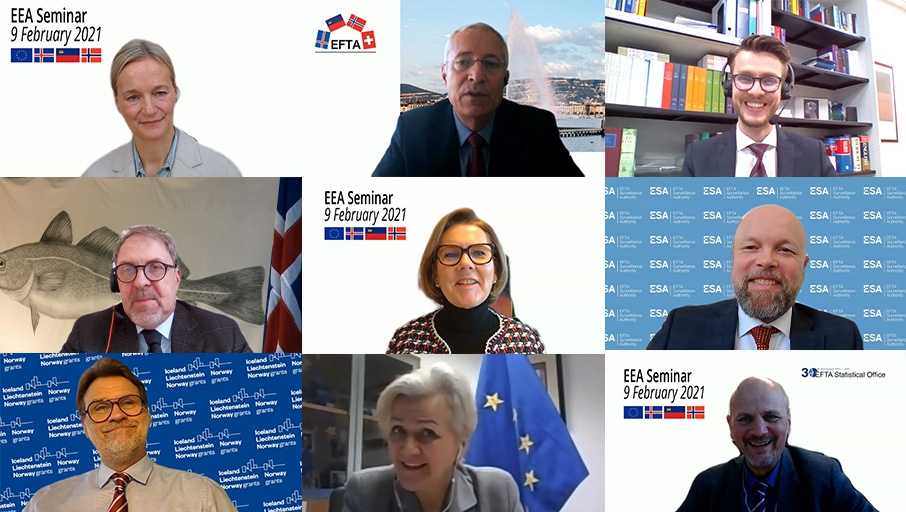
The first biannual EEA Seminar of 2021 goes live with a record participation

The biannual seminar on the European Economic Area (EEA) was held online on 9 February. The seminar is intended to provide an overall comprehension of the functioning of the EEA to professionals both inside and outside the European Union (EU) with a focus on how the three participating EFTA States – Iceland, Liechtenstein and Norway are integrated into the EU’s Internal Market.
With more than 300 participants from both public and private sectors, the seminar remained interactive allowing time for questions that attendees could ask through chat facilities. The whole event was moderated by Thorfinnur Omarsson, Head of Information and Communication at the EFTA Secretariat.
“The three EEA EFTA States have managed to secure a fantastic structure to ensure a stable and favourable contribution to European integration for the benefit both of our people in companies and of our EU partners”, said EFTA Secretary-General Henri Gétaz in his opening remarks. “The credibility of the EEA is high and it helps us when reaching out to and establishing working relations with the new leadership in European institutions.”
Presentations were given by the EFTA Secretariat, the EFTA Statistical Office, the EFTA Surveillance Authority, the EFTA Court as well as the EEA and Norway Grants, the Embassy of Iceland to the EU, and the European External Action Service (EEAS) to provide the audience with a variety of views of the EEA Agreement.
In the morning session, Hege Marie Hoff, EFTA Deputy Secretary-General, and Brit Helle, Director of EFTA’s Internal Market Division, introduced the EEA Agreement and gave presentations on its functioning. Kristján Andri Stefánsson, Chair of the EFTA Standing Committee, presented the challenges and priorities of the EEA EFTA States in the first half of 2021. He was followed by a recording of the Managing Director at the EEAS, Angelina Eichhorst, who shared with the audience the EU perspective on the EEA.
“In the circumstances where the EU is experiencing a lot of turbulence in different regions, it is even more important for the EU to count on the EEA EFTA States as its closest friends. This is indeed the deepest, the widest and the most successful partnership the EU has ever had with any other countries in the world”, she said.
The afternoon session started with a presentation on the EFTA advisory bodies followed by one on the EEA & Norway Grants. On the latter, Árni Páll Árnason, Deputy Director at the Financial Mechanism Office, talked about how the EEA & Norway Grants reduce disparities and strengthen cooperation in the EEA. Representatives of the EFTA Surveillance Authority (ESA) and the EFTA Court then shared their expertise explaining respectively how EEA law is enforced and how it is interpreted.
Last but not least, the EFTA Statistical Office (ESO) was presented by its Director, Volker Täube, in the light of ESO’s 30 year anniversary. He underlined the long-lasting cooperation with the European Statistical System and stated that “statistics is the cornerstone of evidence-based policy making.”
To sum it up, the full-day seminar showed once again its relevance with a record participation and very interesting questions from the audience. In the future, hybrid versions of this EEA Seminar could see the light.
Find the recording of the seminar on our EFTA Channel.
Links to the presentations can be found below:
Introduction to the EEA Agreement – Hege Marie Hoff, Deputy Secretary-General, EFTA Secretariat
Functioning of the EEA Agreement and role of the EFTA Secretariat – Brit Helle, Director of IMD, EFTA Secretariat
How EU law becomes EEA law – Finnur Thor Birgisson, Head of Legal, EFTA Secretariat
EEA Publication and Information sources – Kjell Leifsen, Team Coordinator, Translation and Publication, EFTA Secretariat
EFTA Advisory bodies: Parliamentarians, social partners and local/regional representation in the EEA – Christophe Zufferey, Officer to the EFTA & EEA Joint Parliamentary Committee
How EEA & Norway Grants reduce disparities and strengthen cooperation in the EEA – Árni Páll Árnason, Deputy Director, Financial Mechanism Office (EEA & Norway Grants)
Surveillance: How EEA law is enforced – Jarle Hetland, Head of Communications, EFTA Surveillance Authority
Judicial control: How EEA law is interpreted – Birgir Hrafn Búason, Senior Lawyer administrator, EFTA Court
EFTA Statistical cooperation with Eurostat for 30 years – Volker Täube, Director of EFTA Statistical Office